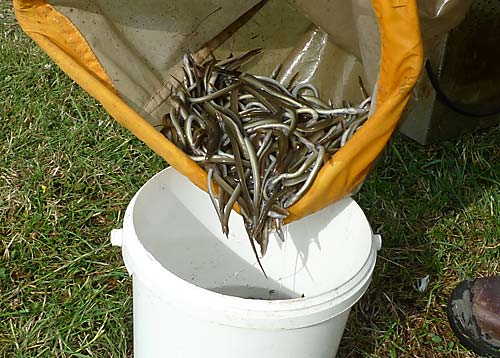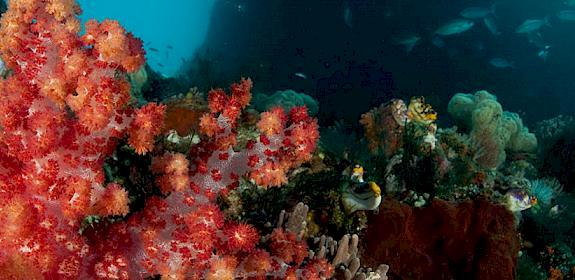Eels flounder as scientists’ advice goes unheeded
Cambridge, UK, 1st November 2010—On the day the fishing season for juvenile European Eels begins, the European Union (EU) has still to decide what quantities can be legally exported.

The European Eel faces a very bleak future unless levels of fishing are seriously reduced and trade levels adapted accordingly warns TRAFFIC, the wildlife trade monitoring network.
Last month the EU´s Scientific Review Group on Trade in Wild Fauna and Flora (SRG) expressed its deep concern about current levels of fishing and advised the EU to suspend all imports and exports of European Eels to enable eel populations to recover following a 90% decline in numbers of juvenile eels found in the region’s waters since the 1980s.
But the EU has not yet followed the SRG advice and if it fails to agree on export quotas at the EU level, Member States could take matters into their own hands and decide on levels of exports on a national basis only.
“TRAFFIC urges the EU to heed the advice of its own scientific panel and suspend trade in European Eels until the SRG can determine that the impact of fishing for exports and imports are not threatening the status of the species as a whole,” said Stephanie von Meibom, TRAFFIC’s European Programme Co-ordinator.
“Exploitation of eels by any one Member State impacts the region’s entire eel population and therefore management purely at the national level makes no sense. Furthermore, it is inconsistent with EU policy which emphasises harmony, consistency and coherence between Member States.”
The EU attitude towards scientific advice also appears inconsistent; last month the EU followed SRG advice and decided not to import Caspian Sea caviar because of the Group’s concerns over how quota levels for fishing and export were set.
European Eels are caught in several EU Member States for direct consumption, restocking, farming and export, with large quantities of wild juvenile eels or “glass eels” exported to Asia where they are reared in farms to commercial sizes.
According to a recent TRAFFIC report on eel trade compiled on behalf of the European Commission, between 1998 and 2008 the EU exported around 3,000 tonnes of eels which is estimated to include over 2 billion juvenile eels. France is the principal exporter of eels, and China the top destination. However, even greater numbers of eels are traded and consumed within the EU and unless overall fishing levels are reduced the species faces a bleak future.
Concern over the role of international trade in the decline of European Eel numbers in recent decades led to the species being listed in CITES (the Convention on International Trade in Endangered Species of Wild Fauna and Flora) in 2007—following an EU proposal to do so.
Later in 2007, the EU established a Regulation that set a requirement for Member States to establish national Eel Management Plans to address the numerous threats to eel populations including fishing, pollution and obstructions such as dams.
“Even with a total ban on eel fishing, best estimates are that it would take 80 years for eel populations to recover,” says Vicki Crook, TRAFFIC Programme Officer and author of a recent report on eel trade.
“The adoption of this Regulation and the listing of the European Eel in CITES are steps in the right direction. Now EU Member States must stand by these commitments in order to save the species from extinction.”
Notes:
The European Eel Anguilla anguilla is considered Critically Endangered by the International Union for the Conservation of Nature (IUCN), and faces a high threat of extinction in the wild.
The International Council for Exploration of the Sea (ICES) has warned that the European Eel fishery is not sustainable and advised that fishing of and use of glass eels for any purpose, including restocking, should be reduced to close to zero until the stock has recovered.
TRAFFIC's latest report on eel trade prepared for the European Commission: Trade in Anguilla species, with a focus on recent trade in European Eel A. anguilla



